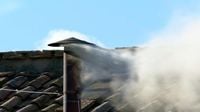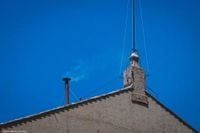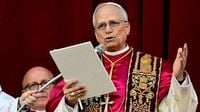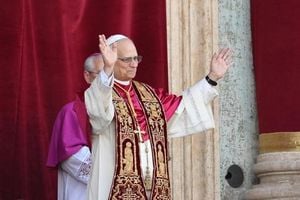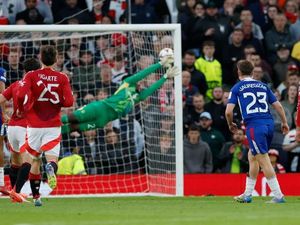VATICAN CITY - In a historic moment for the Catholic Church, Cardinal Robert Prevost has been elected as the first American pope, taking the name Pope Leo XIV. The announcement came shortly after white smoke billowed from the chimney of the Sistine Chapel at 6:08 PM on May 8, 2025, signaling the conclusion of the papal conclave that lasted just over 25 hours.
The conclave, which began on the afternoon of May 7, saw the 133 cardinal-electors gather to select a successor to Pope Francis, who passed away last month at the age of 88. The election marks a significant milestone in the Church's history, as it is the first time an American has ascended to the papacy.
As the bells of St. Peter's Basilica tolled, signaling the election, a crowd of thousands gathered in St. Peter's Square erupted in cheers. Cardinal Dominique Mamberti, the Cardinal Proto-Deacon, is expected to formally announce the new pope's name, which has already been revealed to the world.
Cardinal Prevost, 69, expressed his gratitude to the fellow cardinals for their support and emphasized his desire to spread a message of peace. In his first words as pope, he said, "Peace be with all of you!" He added that he hopes his message of peace will "enter your hearts, reach your families and all people, wherever they are." His address included greetings in Italian, Spanish, and Latin, reflecting his diverse pastoral background.
Born in Chicago in 1955, Prevost joined the Order of Saint Augustine in 1977 and was ordained in 1982. He has spent significant time in Peru, where he served as a missionary and later as the bishop of the Diocese of Chiclayo. His extensive experience in pastoral and academic roles has shaped his vision for the Church. In January 2023, he was appointed prefect of the Dicastery for Bishops, a crucial position in the Vatican responsible for episcopal appointments worldwide.
Prevost's election comes at a time when the Catholic Church faces numerous challenges, including the need for greater inclusivity and engagement with contemporary issues. In his first address, he emphasized that "God loves us all unconditionally" and called for a Church that is open and welcoming. He stated, "Let us be disciples of Christ. Humanity needs Him. Let us build bridges and be one people. Together as a missionary Church, always open to welcoming everyone."
The conclave was marked by a spirit of discernment and prayer, with the cardinals reflecting on the qualities needed in a new pope. The election process was conducted under strict secrecy, with a two-thirds majority required for a candidate to be elected. Although the exact number of ballots cast remains unclear, it is known that the election concluded after either four or five rounds of voting.
Pope Francis, who died on Easter Monday, was known for his focus on social justice, climate change, and outreach to marginalized communities. His passing left a profound impact on the Church, and many have expressed hope that Pope Leo XIV will continue in the spirit of his predecessor. Cardinal Giovanni Battista Re, who eulogized Francis, described him as "a pope among the people, with an open heart towards everyone."
As the first American pope, Prevost's election has stirred excitement not just in the Vatican, but also across the United States. President Trump congratulated him on social media, stating, "It is such an honor to realize that he is the first American Pope. What excitement, and what a Great Honor for our Country." Brandon Johnson, the mayor of Chicago, also expressed his enthusiasm, remarking, "Everything dope, including the Pope, comes from Chicago!"
The significance of this election extends beyond national pride; it reflects the increasingly global nature of the Catholic Church. The conclave featured cardinal-electors from 71 different countries, making it one of the most geographically diverse gatherings in the Church's history. This diversity is crucial as the Church seeks to address the needs of its global congregation.
Following the election, the new pope was presented to the world from the loggia of St. Peter's Basilica, where he led the crowd in prayer and expressed his gratitude for their support. The moment was met with jubilation as the faithful celebrated the beginning of a new papacy.
Pope Leo XIV's choice of name is also noteworthy; he has chosen to honor Pope Leo XIII, known for his efforts to engage with modernity while upholding traditional doctrine. This decision may signal his intention to navigate the complexities of contemporary issues while maintaining the core values of the Church.
As the Catholic community around the world welcomes Pope Leo XIV, there is a palpable sense of hope and anticipation. His commitment to openness, peace, and unity resonates with the needs of a Church eager for renewal. The new pontiff's journey begins amidst a backdrop of challenges, but his message of love and inclusivity may pave the way for a transformative papacy.
With the conclusion of this conclave, the Catholic Church stands at a crossroads, ready to embrace a new chapter under the leadership of Pope Leo XIV. The faithful look forward to seeing how his vision will unfold in the years to come, as he leads the Church into a future marked by both tradition and change.
